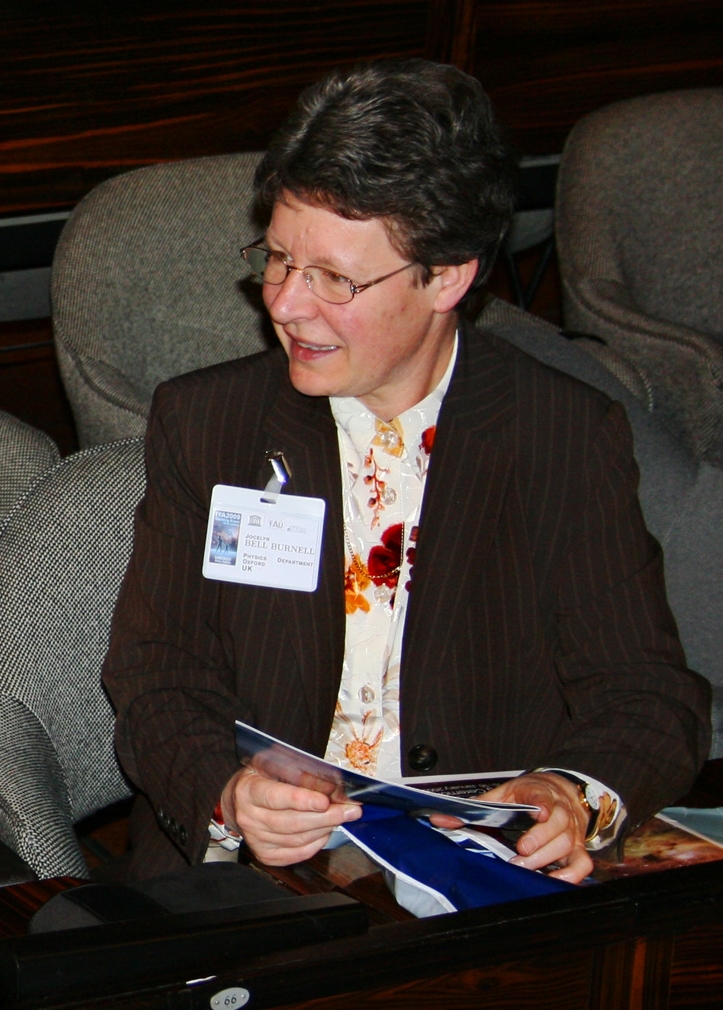Jocelyn Bell Burnell

Dame Susan Jocelyn Bell Burnell DBE FRS FRSE FRAS FInstP (born 15 July 1943) is an astrophysicist from Northern Ireland who, as a postgraduate student, discovered the first radio pulsars in 1967. The discovery eventually earned the Nobel Prize in Physics in 1974; however, she was not one of the prize's recipients.
She attended the University of Glasgow, where she received a bachelor’s degree (1965) in physics. She proceeded to the University of Cambridge, where she was awarded a doctorate (1969) in radio astronomy.
As a research assistant at Cambridge, she aided in constructing a large radio telescope and in 1967, while reviewing the printouts of her experiments monitoring quasars, discovered a series of extremely regular radio pulses. Puzzled, she consulted her adviser, astrophysicist Antony Hewish, and their team spent the ensuing months eliminating possible sources of the pulses, which they jokingly dubbed LGM (for Little Green Men) in reference to the remote possibility that they represented attempts at communication by extraterrestrial intelligence.
After monitoring the pulses using more-sensitive equipment, the team discovered several more regular patterns of radio waves and determined that they were in fact emanating from rapidly spinning neutron stars, which were later called pulsars by the press.
Why did Bell Burnell not win the Nobel Prize?
The paper announcing the discovery of pulsars had five authors. Bell's thesis supervisor Antony Hewish was listed first, Bell second. Hewish was awarded the Nobel Prize, along with the astronomer Martin Ryle. At the time fellow astronomer Sir Fred Hoyle criticised Bell's omission. In 1977, Bell Burnell commented, "I believe it would demean Nobel Prizes if they were awarded to research students, except in very exceptional cases, and I do not believe this is one of them." The Royal Swedish Academy of Sciences, in its press release announcing the prize, cited Ryle and Hewish for their pioneering work in radio-astrophysics, with particular mention of Ryle's work on aperture-synthesis technique and Hewish's decisive role in the discovery of pulsars.
In 2018, she was awarded the Special Breakthrough Prize in Fundamental Physics. Following the announcement of the award, she decided to use the £2.3 million prize money to establish the Bell Burnell Graduate Scholarship Fund, to help female, minority and refugee students become physics researchers. The fund is administered by the Institute of Physics.
What is Astrophysics?
Astrophysics is a science that employs the methods and principles of physics and chemistry in the study of astronomical objects and phenomena. As one of the founders of the discipline said, Astrophysics "seeks to ascertain the nature of the heavenly bodies, rather than their positions or motions in space–what they are, rather than where they are."
Among the subjects studied are the sun, other stars, galaxies, extra-solar planets, the interstellar medium and the cosmic microwave background. Emissions from these objects are examined across all parts of the electromagnetic spectrum, and the properties examined include luminosity, density, temperature, and chemical composition. Because astrophysics is a very broad subject, astrophysicists apply concepts and methods from many disciplines of physics and chemistry.
Journeys of Discovery: Jocelyn Bell Burnell and Pulsars
Jocelyn Bell Burnell: Google Zeitgeist 2019
What is Astrophysics?
Lesson Activities
Seeking a greater understanding of the universe was a vital part of Jocelyn Bell Brunell's life. Scoilnet has a wonderful collection of solar system related resources. Provided by Professor Smartt from Queens University Belfast the resources comprise presentation PowerPoints and a series of six video talks - presented from the Professor's home during the lockdown of 2020.
They are suitable for students at upper primary and secondary. All you need is a little curiosity.
Professor Smartt's collection on Scoilnet.
Following a career like Jocelyn Bell Burnell
Before branching out into astronomy, Jocelyn Bell Brunell studied for a degree in Physics. Learning Physics gives the student a rich understanding of the real world as it aims to comprehend the behaviour of everything in the physical universe. Because it has such a broad scope it is not surprising that it can be found underpinning areas like engineering; medicine; computing and astronomy.
Studying and passing Physics in the Leaving Certificate is often an essential requirement, if not an advantage, for entry into many third level science, technology and engineering courses.
The Careers Portal has an excellent section on Physics and its career potentials.
Thinking like a scientist
Thinking like a scientist is all about asking and answering questions. Scientists, by their very nature, are curious, open to new ideas and creative.
Are you curious? Can you associate with anything in the following videos?



